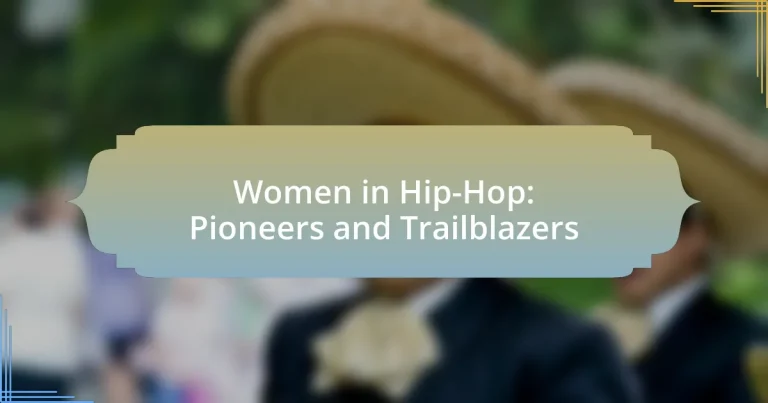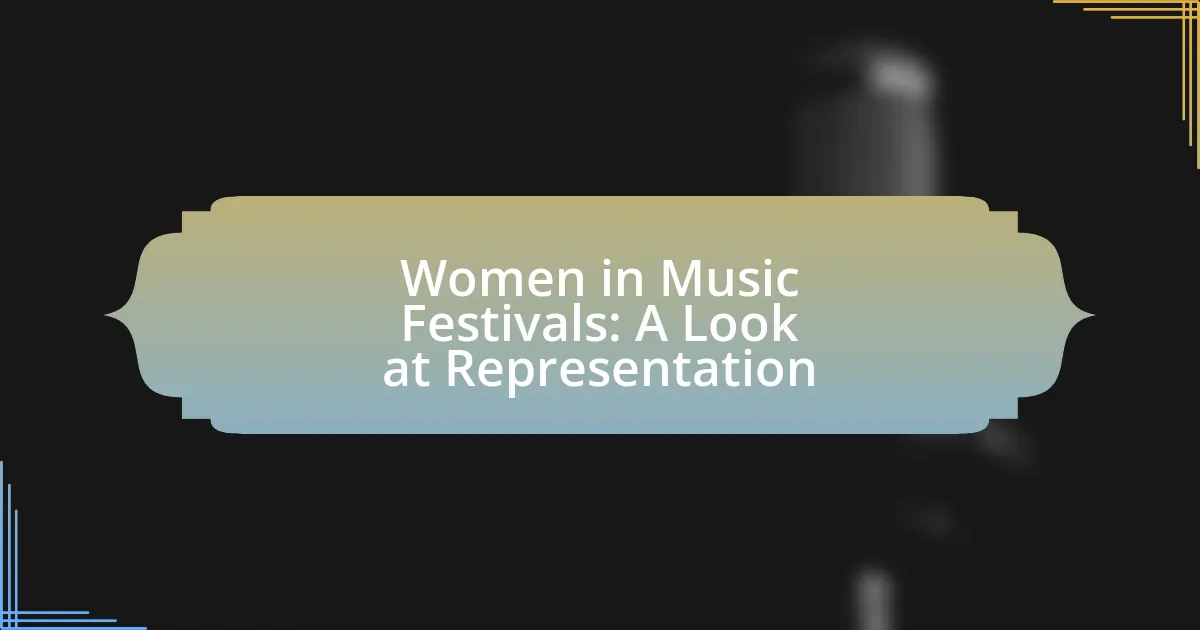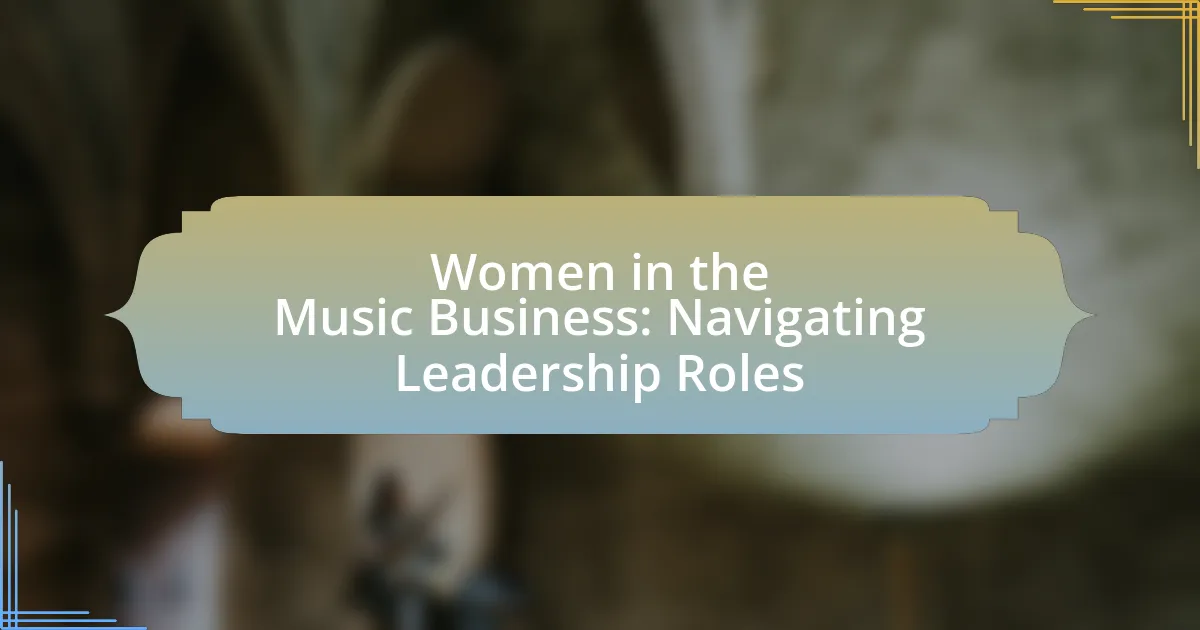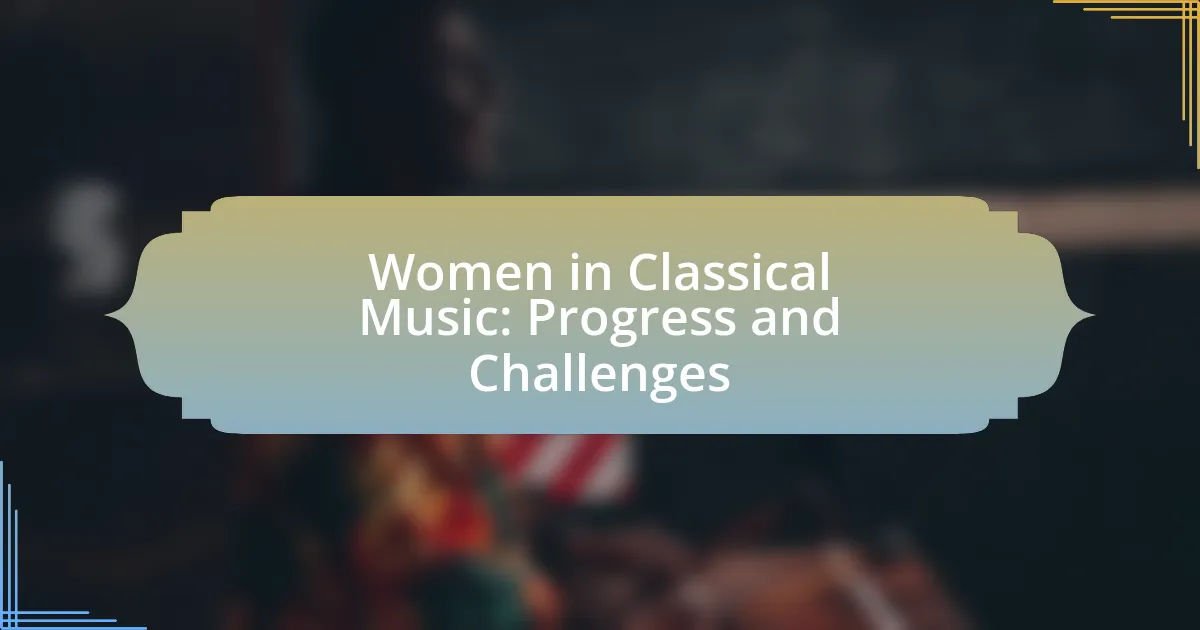Women in hip-hop have played a pivotal role as artists, producers, and cultural influencers, significantly shaping the genre’s evolution. The article highlights the historical contributions of pioneering figures such as MC Lyte and Queen Latifah, who broke barriers in a male-dominated industry, and examines the ongoing challenges women face, including underrepresentation and gender discrimination. Key milestones achieved by female artists, their influence on hip-hop music and style, and the importance of recognizing their contributions are discussed. Additionally, the article explores the impact of female pioneers on future generations, the societal perceptions shaped by their representation, and the initiatives supporting women in the industry.
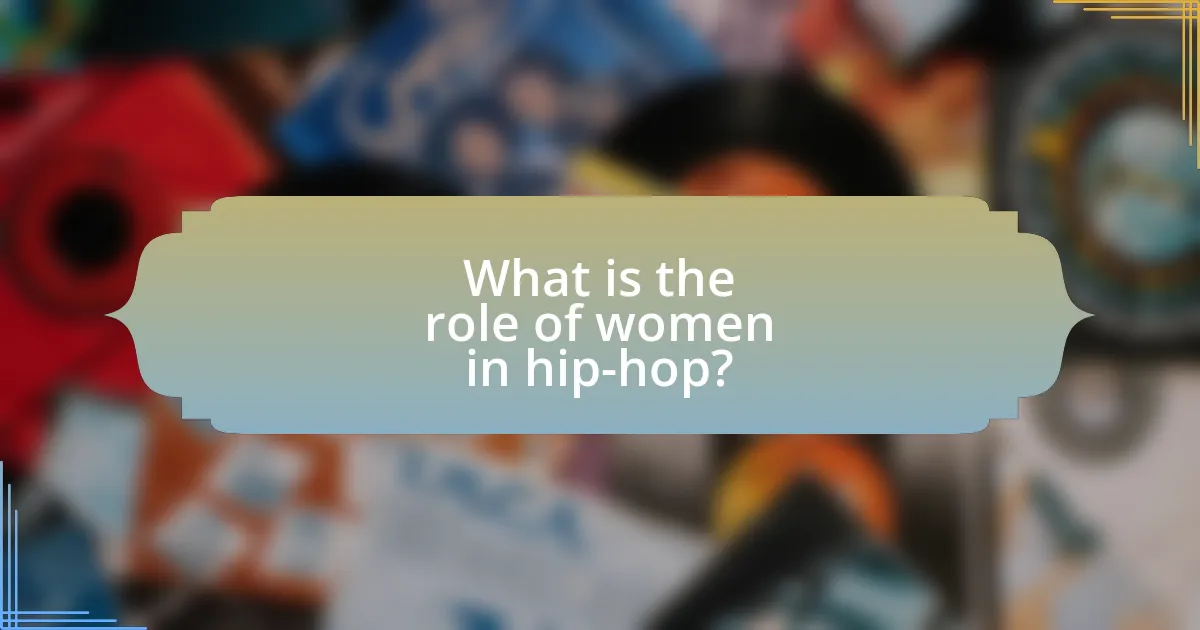
What is the role of women in hip-hop?
Women in hip-hop play a crucial role as artists, producers, and cultural influencers, significantly shaping the genre’s evolution and narrative. Historically, figures like MC Lyte and Queen Latifah broke barriers in the late 1980s and early 1990s, establishing female voices in a predominantly male industry. Their contributions paved the way for contemporary artists such as Nicki Minaj and Cardi B, who continue to challenge gender norms and assert their presence in mainstream hip-hop. According to a 2020 report by the Annenberg Inclusion Initiative, women represented only 21.7% of artists in the top 100 songs, highlighting ongoing challenges but also the importance of female representation in driving change within the genre.
How have women contributed to the evolution of hip-hop culture?
Women have significantly contributed to the evolution of hip-hop culture through their roles as artists, producers, and activists. Pioneers like MC Lyte and Queen Latifah broke barriers in the late 1980s and early 1990s, showcasing female talent in a male-dominated industry and addressing social issues such as gender equality and empowerment in their lyrics. Additionally, artists like Missy Elliott and Nicki Minaj have pushed creative boundaries, influencing the sound and style of hip-hop while achieving commercial success. Their contributions have not only shaped the genre but also inspired future generations of female artists, leading to a more inclusive and diverse hip-hop culture.
What are some key milestones achieved by women in hip-hop?
Key milestones achieved by women in hip-hop include the emergence of female MCs in the 1980s, such as MC Lyte and Queen Latifah, who broke gender barriers in a male-dominated industry. In 1999, Missy Elliott became the first female rapper to receive a Grammy Award for Best Rap Solo Performance, highlighting women’s contributions to the genre. Additionally, Nicki Minaj’s debut album, “Pink Friday,” released in 2010, debuted at number one on the Billboard 200, making her the first female solo artist to achieve this since Lauryn Hill in 1998. These milestones demonstrate the significant impact women have had in shaping hip-hop culture and music.
How have female artists influenced hip-hop music and style?
Female artists have significantly influenced hip-hop music and style by introducing diverse perspectives, innovative lyrical content, and unique fashion trends. Pioneers like MC Lyte and Queen Latifah broke barriers in the late 1980s and early 1990s, addressing social issues and empowering women through their lyrics. Additionally, artists such as Missy Elliott and Nicki Minaj have pushed the boundaries of creativity in music videos and performances, blending genres and styles that have reshaped the visual and auditory landscape of hip-hop. Their contributions have not only expanded the genre’s appeal but also established a platform for future female artists, leading to a more inclusive and varied hip-hop culture.
Why is it important to recognize women in hip-hop?
Recognizing women in hip-hop is crucial for acknowledging their significant contributions to the genre and culture. Women have played pivotal roles as artists, producers, and influencers, shaping the sound and narrative of hip-hop since its inception. For instance, pioneers like MC Lyte and Queen Latifah broke barriers in the late 1980s and early 1990s, paving the way for future generations of female artists. Furthermore, a report by the Annenberg Inclusion Initiative in 2020 highlighted that only 21.7% of artists in popular music were women, underscoring the need for greater visibility and recognition of female talent in hip-hop. This recognition not only empowers women but also enriches the diversity and authenticity of the hip-hop narrative.
What impact do female pioneers have on future generations of artists?
Female pioneers significantly influence future generations of artists by breaking barriers and establishing new norms within the hip-hop industry. Their contributions, such as those from artists like Queen Latifah and Missy Elliott, have paved the way for greater representation and diversity in music. For instance, Queen Latifah’s success in both music and acting has inspired countless female artists to pursue multifaceted careers, demonstrating that women can excel in various creative fields. Additionally, the rise of female artists in hip-hop has led to increased visibility and acceptance of women’s voices, encouraging younger generations to express themselves authentically. This impact is evident in the growing number of female artists who cite these pioneers as their inspirations, showcasing a direct lineage of influence that shapes the evolving landscape of hip-hop.
How does representation of women in hip-hop affect societal perceptions?
The representation of women in hip-hop significantly influences societal perceptions by challenging traditional gender roles and promoting empowerment. When women artists like Queen Latifah and Missy Elliott present strong, independent personas, they reshape public views on femininity and strength. Research indicates that positive portrayals of women in media, including hip-hop, correlate with increased self-esteem and ambition among female audiences. For instance, a study published in the Journal of Communication found that exposure to empowering female figures in music can lead to more progressive attitudes towards gender equality. Thus, the visibility and portrayal of women in hip-hop play a crucial role in transforming societal norms and expectations regarding gender.
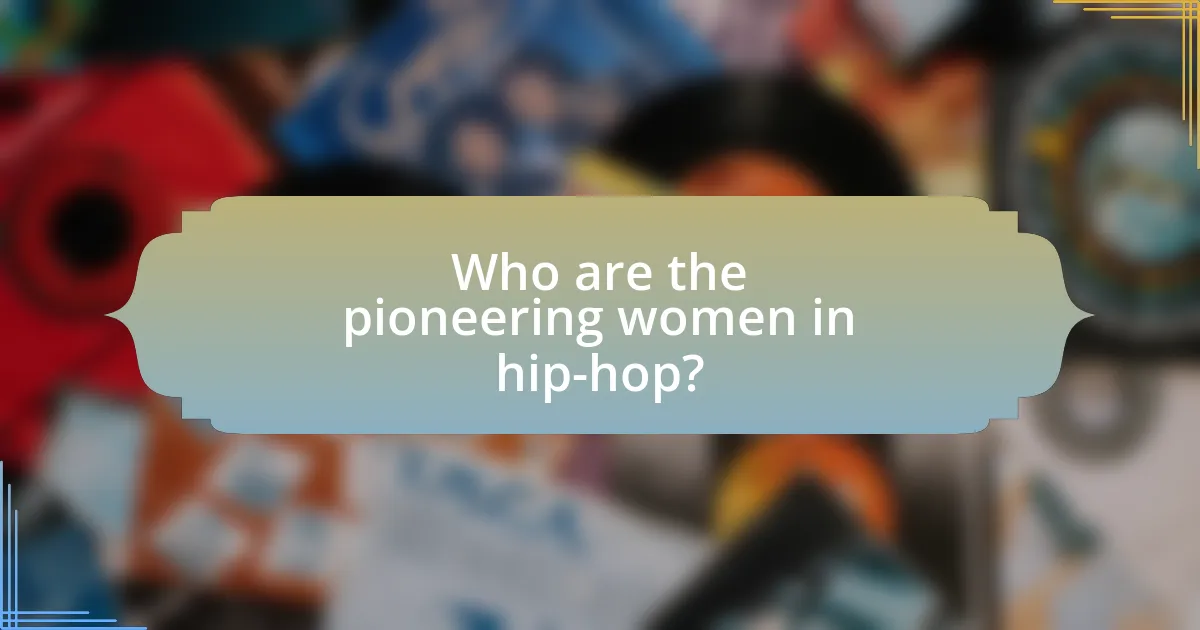
Who are the pioneering women in hip-hop?
The pioneering women in hip-hop include MC Lyte, Queen Latifah, Salt-N-Pepa, and Missy Elliott. MC Lyte, who debuted in the late 1980s, was one of the first female solo rappers to gain recognition, known for her lyrical prowess and influence on future artists. Queen Latifah emerged as a powerful voice in the late 1980s and early 1990s, blending rap with themes of empowerment and social justice. Salt-N-Pepa, also from the late 1980s, were among the first all-female rap groups, breaking barriers with their hit songs and promoting female sexuality and independence. Missy Elliott, who debuted in the late 1990s, revolutionized hip-hop with her innovative music videos and unique style, becoming a significant figure in the genre. These women have not only shaped hip-hop but have also paved the way for future generations of female artists.
What are the contributions of early female hip-hop artists?
Early female hip-hop artists significantly contributed to the genre by breaking gender barriers and influencing its cultural landscape. Artists like MC Lyte, Queen Latifah, and Salt-N-Pepa not only showcased their lyrical prowess but also addressed social issues such as sexism, empowerment, and identity in their music. For instance, MC Lyte’s debut album “Lyte as a Rock” in 1988 was groundbreaking, as it featured strong narratives that challenged the male-dominated hip-hop scene. Queen Latifah’s “Ladies First” emphasized female empowerment and solidarity, becoming an anthem for women in hip-hop. Salt-N-Pepa’s hit “Push It” popularized female voices in mainstream hip-hop, demonstrating commercial viability for women artists. These contributions laid the groundwork for future generations of female artists, establishing a legacy of resilience and creativity within the hip-hop community.
Who were the first female MCs and what did they achieve?
The first female MCs were Sha-Rock, who was part of the Funky 4 + 1, and Debbie Harry of Blondie, who incorporated rap into her music. Sha-Rock is recognized for being one of the first women to perform as an MC in the late 1970s, breaking gender barriers in a male-dominated genre. She achieved significant recognition for her lyrical skills and stage presence, contributing to the visibility of women in hip-hop. Debbie Harry’s collaboration with the band Blondie on the song “Rapture” in 1981 brought rap to a mainstream audience, showcasing the genre’s potential for crossover appeal. Both women played crucial roles in paving the way for future female artists in hip-hop, establishing a foundation for their contributions to the genre.
How did these pioneers pave the way for future female artists?
These pioneers paved the way for future female artists by breaking gender barriers and establishing a presence in a male-dominated industry. Artists like MC Lyte and Queen Latifah not only showcased their talent but also addressed social issues, empowering subsequent generations of women to express themselves through hip-hop. Their success demonstrated that female artists could achieve commercial viability and critical acclaim, leading to increased visibility and opportunities for women in the genre. For instance, MC Lyte was one of the first female rappers to release a full-length album, “Lyte as a Rock,” in 1988, which set a precedent for future female artists to follow.
What notable achievements have women in hip-hop accomplished?
Women in hip-hop have accomplished significant milestones, including breaking barriers in a male-dominated industry and achieving commercial success. Notably, Queen Latifah became the first female rapper to receive a Grammy Award in 1994, while Missy Elliott made history as the first female rapper inducted into the Songwriters Hall of Fame in 2019. Additionally, Nicki Minaj has set records with multiple Billboard chart-topping hits, becoming the first woman to achieve 100 entries on the Billboard Hot 100. These achievements highlight the influential roles women have played in shaping hip-hop culture and music.
Which awards and recognitions have female hip-hop artists received?
Female hip-hop artists have received numerous awards and recognitions, including Grammy Awards, MTV Video Music Awards, and Billboard Music Awards. For instance, Queen Latifah won a Grammy Award for Best Rap Solo Performance in 1994, while Missy Elliott has received multiple Grammy Awards, including Best Rap Solo Performance and Best Female Rap Solo Artist. Additionally, Nicki Minaj has been recognized with several Billboard Music Awards, including Top Female Artist. These accolades highlight the significant contributions and impact of female artists in the hip-hop genre.
How have women in hip-hop broken barriers in the music industry?
Women in hip-hop have broken barriers in the music industry by challenging gender norms and achieving significant commercial success. Artists like Missy Elliott and Nicki Minaj have not only topped charts but also redefined the roles of women in a predominantly male-dominated genre. For instance, Missy Elliott’s innovative music videos and production techniques have influenced countless artists, while Nicki Minaj’s ability to blend rap with pop has expanded the audience for female rappers. Additionally, women like Queen Latifah and Salt-N-Pepa have paved the way by addressing social issues and empowering women through their lyrics, demonstrating that female voices can resonate powerfully in hip-hop. Their contributions have led to increased visibility and opportunities for future generations of female artists, fundamentally altering the landscape of the music industry.
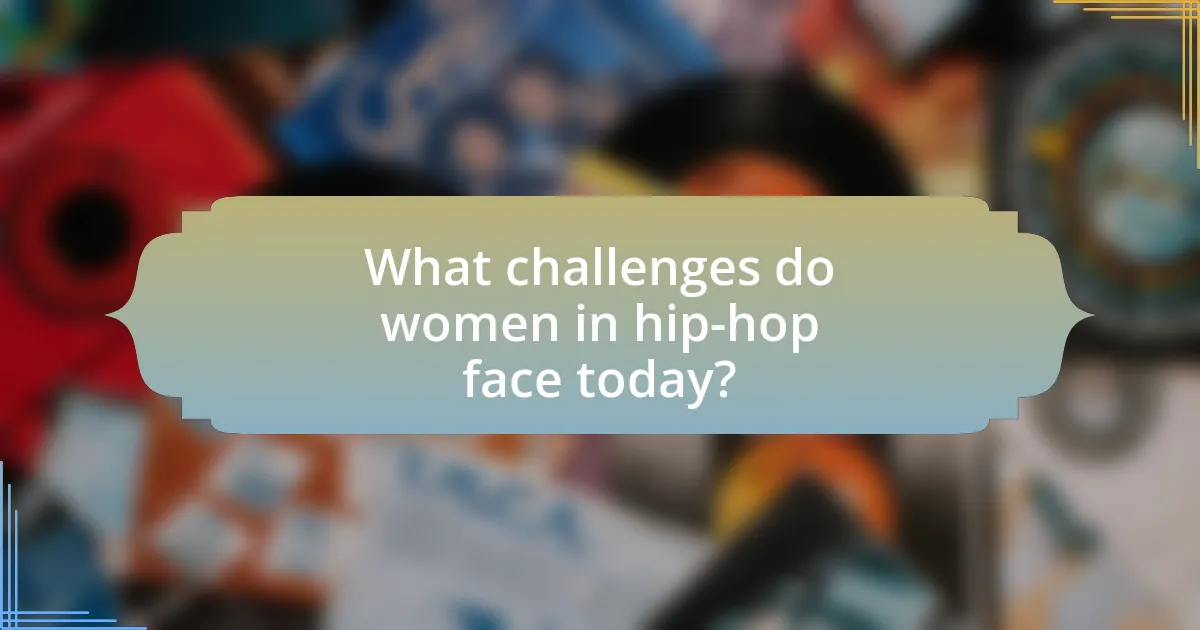
What challenges do women in hip-hop face today?
Women in hip-hop face significant challenges today, including gender discrimination, underrepresentation, and sexual objectification. Gender discrimination manifests in the form of unequal opportunities for women compared to their male counterparts, limiting their access to resources and platforms. Underrepresentation is evident in the lack of female artists in mainstream hip-hop, where women often struggle to gain visibility and recognition. Additionally, sexual objectification persists, as women are frequently portrayed in ways that emphasize their physical appearance over their artistic contributions, which undermines their credibility as serious artists. These challenges are supported by studies indicating that female artists receive less airplay and fewer awards than males, highlighting systemic biases within the industry.
How do gender stereotypes impact female artists in hip-hop?
Gender stereotypes significantly impact female artists in hip-hop by limiting their creative expression and reinforcing traditional gender roles. Female artists often face scrutiny regarding their appearance, behavior, and lyrical content, which can lead to a lack of representation and opportunities in the industry. For instance, a study by the Annenberg Inclusion Initiative found that only 22.5% of artists in popular music were women, highlighting the gender disparity. Additionally, female hip-hop artists frequently encounter pressure to conform to hypersexualized images, which can overshadow their musical talent and artistic contributions. This environment can discourage women from pursuing careers in hip-hop or lead to self-censorship, ultimately stifling diversity and innovation within the genre.
What are the common obstacles faced by women in the industry?
Women in the hip-hop industry commonly face obstacles such as gender discrimination, lack of representation, and limited access to resources. Gender discrimination manifests in the form of biases that undermine women’s contributions and talent, often leading to fewer opportunities for advancement compared to their male counterparts. The lack of representation is evident in the underrepresentation of women in key roles, including production, management, and executive positions, which perpetuates a cycle of inequality. Additionally, limited access to resources, such as funding and mentorship, hinders women’s ability to develop their careers and gain visibility in a male-dominated industry. These challenges are supported by studies indicating that women in hip-hop often encounter systemic barriers that restrict their professional growth and recognition.
How do female artists navigate sexism in hip-hop culture?
Female artists navigate sexism in hip-hop culture by asserting their identities, challenging stereotypes, and leveraging their platforms for advocacy. They often employ strategies such as collaboration with male artists to gain visibility, using provocative imagery and lyrics to reclaim narratives, and engaging in activism to address gender inequality within the industry. For instance, artists like Nicki Minaj and Cardi B have openly discussed their experiences with sexism, using their music and public personas to confront misogyny and promote female empowerment. This approach not only highlights their resilience but also fosters a community of support among women in hip-hop, as seen in initiatives like the Women in Hip-Hop Summit, which aims to uplift and empower female voices in the genre.
What initiatives support women in hip-hop?
Initiatives that support women in hip-hop include organizations like the Hip Hop Sisters Network, which promotes female artists and provides mentorship, and the Women’s Hip-Hop Summit, which focuses on empowering women through education and networking opportunities. Additionally, the She Is the Music initiative aims to increase the representation of women in the music industry, including hip-hop, by providing resources and support for female creators. These initiatives are crucial as they address the gender disparity in the hip-hop industry, where women have historically been underrepresented.
Which organizations are dedicated to empowering female artists?
Organizations dedicated to empowering female artists include the Women’s Audio Mission, which focuses on providing women and girls with training in audio technology and music production. Another significant organization is Girls Who Code, which, while primarily focused on technology, also supports female artists in digital media. Additionally, the National Museum of Women in the Arts promotes the visibility of women artists through exhibitions and educational programs. These organizations collectively contribute to the empowerment and advancement of female artists across various disciplines.
How do mentorship programs benefit women in hip-hop?
Mentorship programs benefit women in hip-hop by providing essential guidance, networking opportunities, and skill development. These programs connect emerging female artists with established professionals, fostering an environment where knowledge and experience can be shared. For instance, initiatives like the “Women in Hip-Hop” mentorship program have been shown to increase visibility and support for female artists, leading to higher representation in the industry. Research indicates that mentorship can enhance career advancement, with 70% of mentees reporting improved confidence and skills, which directly contributes to their success in a male-dominated field.
What can aspiring female artists learn from pioneers in hip-hop?
Aspiring female artists can learn resilience, authenticity, and the importance of carving their own space from pioneers in hip-hop. Pioneers like Queen Latifah and Missy Elliott broke barriers in a male-dominated industry, demonstrating that strong, unique voices can achieve success. Their careers highlight the significance of staying true to one’s identity and using personal experiences as inspiration, which has been crucial for their lasting impact. For instance, Queen Latifah’s work in both music and acting showcases versatility and the ability to transcend genres, while Missy Elliott’s innovative music videos and production techniques set new standards in creativity. These examples illustrate that aspiring artists can thrive by embracing their individuality and pushing creative boundaries.
What strategies can women use to succeed in the hip-hop industry?
Women can succeed in the hip-hop industry by leveraging their unique perspectives, building strong networks, and mastering their craft. Emphasizing authenticity allows women to connect with audiences on a personal level, as seen with artists like Nicki Minaj and Cardi B, who have both shared their life experiences through their music. Networking is crucial; collaborations with established artists can provide visibility and credibility, as demonstrated by Megan Thee Stallion’s partnerships with prominent figures in the industry. Additionally, honing skills in songwriting, production, and performance ensures that women can compete effectively, as evidenced by the success of artists like Rapsody, who is recognized for her lyrical prowess and musical versatility.
How can female artists build a supportive community in hip-hop?
Female artists can build a supportive community in hip-hop by collaborating on projects, sharing resources, and creating platforms for visibility. Collaboration fosters relationships and amplifies voices, as seen in initiatives like the “Sisterhood” movement, which encourages female artists to work together on music and performances. Sharing resources, such as knowledge about the industry, funding opportunities, and mentorship, strengthens the community, exemplified by organizations like Women in Hip Hop, which provide support and networking. Creating platforms for visibility, such as female-focused events and showcases, allows artists to gain exposure and recognition, contributing to a more inclusive environment in the hip-hop scene.
